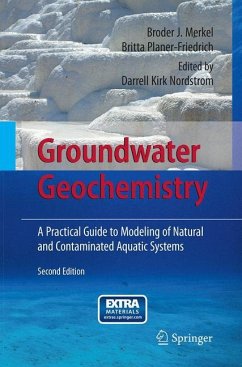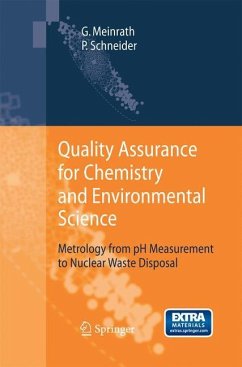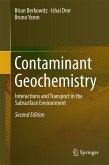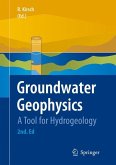To understand hydrochemistry and to analyze natural as well as man-made impacts on aquatic systems, hydrogeochemical models have been used since the 1960's and more frequently in recent times. Numerical groundwater flow, transport, and geochemical models are important tools besides classical deterministic and analytical approaches. Solving complex linear or non-linear systems of equations, commonly with hundreds of unknown parameters, is a routine task for a PC. Modeling hydrogeochemical processes requires a detailed and accurate water analysis, as well as thermodynamic and kinetic data as input. Thermodynamic data, such as complex formation constants and solubility-products, are often provided as databases within the respective programs. However, the description of surface-controlled reactions (sorption, cation exchange, surface complexation) and kinetically controlled reactions requires additional input data. Unlike groundwater flow and transport models, thermodynamic models, in principal, do not need any calibration. However, considering surface-controlled or kinetically controlled reaction models might be subject to calibration. Typical problems for the application of geochemical models are: - speciation - determination of saturation indices - adjustment of equilibria/disequilibria for minerals or gases - mixing of different waters - modeling the effects of temperature - stoichiometric reactions (e.g. titration) - reactions with solids, fluids, and gaseous phases (in open and closed systems) - sorption (cation exchange, surface complexation) - inverse modeling - kinetically controlled reactions - reactive transport Hydrogeochemical models depend on the quality of the chemical analysis, the boundary conditions presumed by the program, theoretical concepts (e.g.
From the reviews:
"Merkel and Planer-Friedrich ... provide an excellent introduction to hydrogeochemical modeling for analyzing natural and human impacts on aquatic systems. ... it is intended as a practical guide to modeling, but it will make an excellent supplementary resource for the students. Summing Up: Highly recommended. Upper-division undergraduates through professionals." (M. S. Field, CHOICE, November, 2005)
"This book focuses on giving practical support for geochemical modelling ... . Is it worthwhile to buy this book ... ? Absolutely yes! ... Altogether 69 clearly and carefully explained exercises are provided to enhance the knowledge step-by-step. ... This book is recommended to all those with some basic hydrogeological or chemical understanding, to graduate students in geosciences, environmental sciences or related studies as well as to representatives of public authorities and enterprises who want to understand the hydrogeochemical interactions better." (Andreas Winkler, Environmental Geology, Vol. 48, 2005)
"Merkel and Planer-Friedrich ... provide an excellent introduction to hydrogeochemical modeling for analyzing natural and human impacts on aquatic systems. ... it is intended as a practical guide to modeling, but it will make an excellent supplementary resource for the students. Summing Up: Highly recommended. Upper-division undergraduates through professionals." (M. S. Field, CHOICE, November, 2005)
"This book focuses on giving practical support for geochemical modelling ... . Is it worthwhile to buy this book ... ? Absolutely yes! ... Altogether 69 clearly and carefully explained exercises are provided to enhance the knowledge step-by-step. ... This book is recommended to all those with some basic hydrogeological or chemical understanding, to graduate students in geosciences, environmental sciences or related studies as well as to representatives of public authorities and enterprises who want to understand the hydrogeochemical interactions better." (Andreas Winkler, Environmental Geology, Vol. 48, 2005)
"Merkel and Planer-Friedrich ... provide an excellent introduction to hydrogeochemical modeling for analyzing natural and human impacts on aquatic systems. ... it is intended as a practical guide to modeling, but it will make an excellent supplementary resource for the students. Summing Up: Highly recommended. Upper-division undergraduates through professionals." -- (M. S. Field, CHOICE, November, 2005)
"This book focuses on giving practical support for geochemical modelling ... . Is it worthwhile to buy this book ... ? Absolutely yes! ... Altogether 69 clearly and carefully explained exercises are provided to enhance the knowledge step-by-step. ... This book is recommended to all those with some basic hydrogeological or chemical understanding, to graduate students in geosciences, environmental sciences or related studies as well as to representatives of public authorities and enterprises who want to understand the hydrogeochemical interactions better." -- (Andreas Winkler, Environmental Geology, Vol. 48, 2005)
"This book focuses on giving practical support for geochemical modelling ... . Is it worthwhile to buy this book ... ? Absolutely yes! ... Altogether 69 clearly and carefully explained exercises are provided to enhance the knowledge step-by-step. ... This book is recommended to all those with some basic hydrogeological or chemical understanding, to graduate students in geosciences, environmental sciences or related studies as well as to representatives of public authorities and enterprises who want to understand the hydrogeochemical interactions better." -- (Andreas Winkler, Environmental Geology, Vol. 48, 2005)








